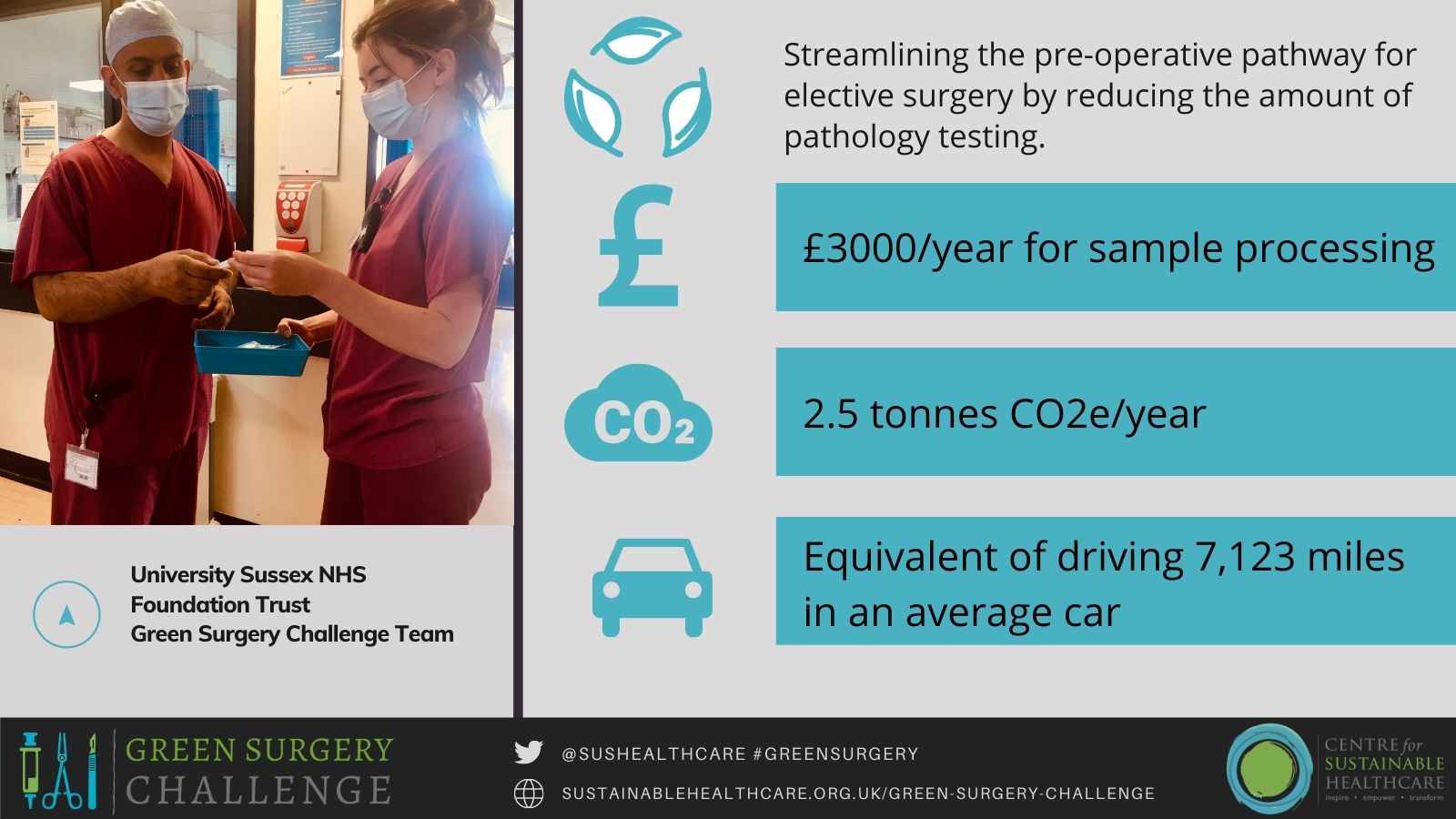
Introducing Team 3 of the Green Surgery Challenge
The Green Surgery Challenge team at University Hospitals Sussex NHS Foundation Trust, focused on streamlining the pre-operative pathway for elective surgery for the project. This approach is an example of the third principle of sustainable clinical practice, ‘lean’ service delivery. The team focused on pathology testing as this is the single highest volume clinical activity in the NHS and so reducing this activity has the potential to make a significant impact for sustainable healthcare.
The team was led by Dr Alyss Robinson, Mr Shameen Jaunoo and Professor Mansoor Khan.
Read the full case study here.
Summary
The team chose to assess laparoscopic cholecystectomies as it is a common procedure carried out frequently by members of the team; on average 250-300 laparoscopic cholecystectomies are performed in the Trust per year. Patients who have day case laparoscopic cholecystectomies (LC) are required by University Hospitals Sussex (UHS) Trust guidelines to attend on two separate occasions for group and save (G&S) blood tests to be taken. The rationale is to facilitate urgent perioperative transfusions, if needed, despite clinical experience suggesting that the procedure has a low bleeding risk. The team decided to investigate the impact on sustainable value of eliminating one G&S test prior to laparoscopic cholecystectomy.
To present their ideas and address any concerns, the team approached colleagues by email, in person and at departmental meetings. They successfully gathered support for their project with a number of the team helping with data collection and engaging other staff.
The team systematically assessed all the elements of sustainable value of the Sustainable Quality Improvement framework:
- Clinical implications and patient safety: Dr Robinson conducted a literature search and audit of all patients who had a laparoscopic cholecystectomy at the Trust since January 2020 to assess the risk of significant perioperative bleeding requiring urgent transfusion.
- Environmental impact: The team calculated the carbon footprint of outpatient G&S tests, including the processing and patient travel, that was surprisingly high as the team found that preoperative tests are carried out at a site located at the greatest distance from main residential areas.
- Social impacts: To understand the social implications of the existing preoperative pathway, the team performed a patient survey.
- Financial impacts: A cost analysis for the G&S tests was performed (finding that costs ranging from £10-24 depending on the Trust) and travel costs for patients was also estimated.
The team have concluded that eliminating the second G&S tests from the preoperative workup for laparoscopic cholecystectomies is a safe intervention that will have carbon and financial savings for the trust when implemented, and be more convenient for patients without compromising their safety or clinical outcomes. This simple intervention could be applicable to a variety of surgical procedures.
The project was presented to Anaesthetics Governance Meeting in August 2021 with the aim of gaining agreement of anaesthetist colleagues to apply this intervention to several operations. The team also aim to raise awareness about the carbon footprint of the preoperative process in general as they see further opportunities for streamlining the pre-operative process, especially with the advent of digital pre-operative assessment, including the opportunity for patients to complete their own assessments and even upload some of their own clinical data such as blood pressure, height and weight. The project was also presented to the Trust’s group of ‘Green Ambassadors’ to inspire and encourage them to take action in their own clinical areas and provide an example of sustainable quality improvement in action in their local trust.
Carbon and Financial Impact
Eliminating the second G&S tests from the preoperative workup for laparoscopic cholecystectomies has forecast annual savings of £3,000 for sample processing and 2.5 tonnes CO2e/year. This is the same amount of CO2e as driving 7,173 miles* in an average car (12.5 times from G7 to COP26).
With approximately 61,220 laparoscopic cholecystectomies performed in the UK per year, there could be potential savings of over 600 tonnes CO2e per year, and this approach could be used to address blood bottle shortages in the NHS.
*CO2e comparison: Distance from G7 (Carbis Bay, Cornwall) to COP26 (Glasgow): 573 miles / 922 km. Average car (unknown fuel) GHG emissions: 0.34851kgCO2e/mile.

Dr Olivia Bush, Programme Lead for Sustainable Clinical Practice at the Centre for Sustainable Healthcare, said:
“This is a very timely project, given the current severe shortage of blood bottles in the UK. Strengths of this project include challenging the status quo of routinised blood testing pre-operatively, thoroughly addressing safety concerns through a literature review and audit that clarified the low risk of the change they proposed and involving patients to find out how the proposed changes would affect them. The example of and learning from this project is very widely applicable throughout the health service, within and beyond the surgical community.”
The Green Surgery Challenge is a special adaptation for clinical specialties of the Centre for Sustainable Healthcare’s flagship programme, the Green Ward Competition (an award-winning clinical leadership and engagement programme to improve the environmental sustainability of healthcare). The challenge has been created and delivered through collaboration with a group of supportive partners including NIHR MedTech Co-operative in Surgical Technologies, Royal College of Surgeons England, Royal College of Surgeons Edinburgh, The Sustainable Healthcare Coalition, Brighton and Sussex Medical School and the Association for Perioperative Practice. The Challenge has been made possible through the generosity of our Gold Funders and Sponsors NIHR MedTech Co-operative in Surgical Technologies and Elemental Healthcare, Silver Sponsors Royal College of Surgeons England and Royal College of Surgeons Edinburgh, Bronze Sponsors the AHSN Network, Vanguard Medical Remanufacturing, and Bowa Medical UK. For more information, please click here.

